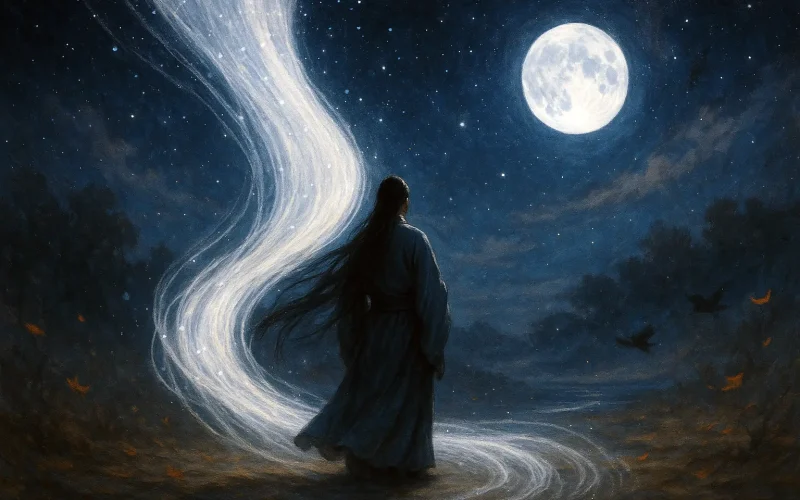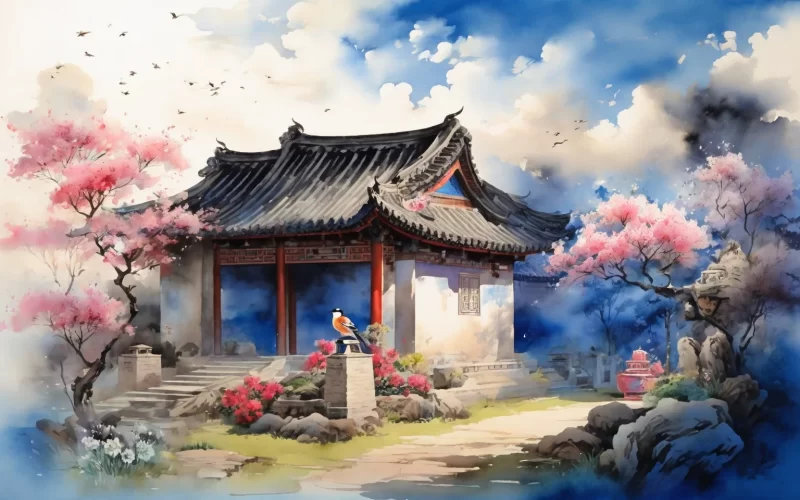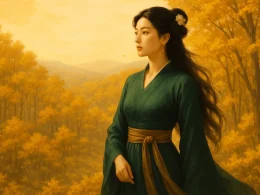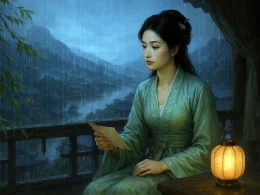My whitening hair would make a long long rope,
In China would there be so much woe?
Look into the mirror, hold no hope!
Where comes the autumn frost, I don’t know!
Original Poem
「秋浦歌 · 其十五」
李白
白发三千丈,缘愁似箇长?
不知明镜里,何处得秋霜!
Interpretation
This poem is the fifteenth in Li Bai's "Autumn River" series, composed around 754 CE when the poet was over fifty. More than a decade had passed since his dismissal from Chang'an ("golden dismissal"), and his once-grand political ambitions had repeatedly foundered against reality. This work crystallizes his late-life mentality, beginning with thunderous exaggeration that elevates personal decline and inescapable sorrow to a breathtaking aesthetic height.
First Couplet: "白发三千丈,缘愁似箇长?"
Báifà sānqiān zhàng, yuán chóu sì gè cháng?
My white hair stretches thirty thousand feet, Because my sorrow's just as long!
The opening breaks upon the reader with an impossible physical image (hair of enormous length) to convey an absolutely real psychological state (profound sorrow). This "illogical yet inspired" hyperbole represents the peak of Li Bai's romanticism—it seeks not literal likeness but to capture emotion's "volume" and "intensity." The word "because" unleashes the floodgates of feeling, directly linking internal, invisible "sorrow" with external, visible "hair." Its resolute logic strengthens the emotion's irrefutability.
Second Couplet: "不知明镜里,何处得秋霜!"
Bùzhī míngjìng lǐ, héchù dé qiūshuāng!
In the bright mirror's reflection, I wonder where this autumn frost came from!
This couplet shifts emotion from torrential outpouring to somber reflection. The "bright mirror" is a cold, objective witness; the "autumn frost" it reflects is both a precise metaphor for white hair and an atmosphere of aging's desolation. The questions "I wonder" and "where from" form the poem's most poignant stroke—not biological ignorance but philosophical anguish: What life setbacks, era shadows, shattered ideals have condensed into today's agedness? This query connects personal fate to broader society, elevating the poem beyond self-pity to critical depth.
Holistic Appreciation
The poem's artistic power stems from its construction of a complete emotional journey from vast to minute, from outward expression to inward reflection. The first line's "thirty thousand feet" gives sorrow cosmic scale; the last line focuses on a momentary doubt before the mirror, contracting space-time to a point. This expansion and contraction create immense tension. Beginning and ending with questions, the poem forms an unsolvable emotional loop, vividly recreating the poet's spiraling, inescapable mental state within great sorrow. It is astonishment, accusation, and a heavy sigh about life and time.
Artistic Merits
- Creative Imagery and Emotional Quantification: By giving abstract sorrow measurable dimension ("thirty thousand feet"), Li Bai makes emotional suffering tangible and overwhelming—representing an ultimate breakthrough in classical Chinese poetry's expression of melancholy.
- Strong Visual Contrast and Perspective Shift: The sudden transition from the impossibly distant ("thirty thousand feet" hair) to the intimately close (mirror reflection) creates psychological intensity through radical perspective change.
- Exquisite Metaphorical System: "White hair" manifests sorrow's physical presence; "autumn frost" symbolizes time's passage; "bright mirror" represents lucid self-awareness—together forming an intricate symbolic network.
- Profound Power of Rhetorical Questions: The poem's conversational questioning appears artless yet contains deeply resonant emotion, achieving what appears "seemingly ordinary yet most extraordinary" in artistic effect.
Insights
This poem demonstrates how true art transforms personal suffering into universally significant aesthetic expression. Li Bai's "thirty-thousand-foot white hair" transcends personal lament to voice the silent cry of all who feel powerless against time and adversity, anxious amid ideal-reality conflicts. It reveals that when life's tragedies and dilemmas are expressed with authentic power, they cease being mere burdens and can become powerful forces that illuminate humanity's shared emotional depths. While acknowledging sorrow's magnitude, we must also recognize the indomitable creative courage and vital energy required to render it as "thirty thousand feet."
About the poet

Li Bai (李白), 701 - 762 A.D., whose ancestral home was in Gansu, was preceded by Li Guang, a general of the Han Dynasty. Tang poetry is one of the brightest constellations in the history of Chinese literature, and one of the brightest stars is Li Bai.












